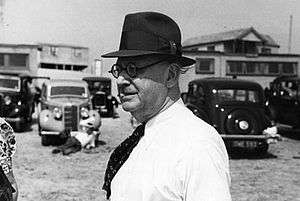Robert Wiene
Robert Wiene (German: [ˈviːnə]; 27 April 1873 – 17 July 1938) was a film director of the silent era of German cinema. He is particularly known for directing the German silent film The Cabinet of Dr. Caligari and a succession of other expressionist films. Wiene also directed a variety of other films of varying styles and genres. Following the Nazi rise to power in Germany, Wiene, who was of Jewish descent,[1] fled into exile.
Robert Wiene | |
|---|---|
 Robert Wiene in the early 1930s | |
| Born | 27 April 1873 |
| Died | 17 July 1938 (aged 65) Paris, France |
| Occupation | |
| Years active | 1913–1938 |
| Family | Carl Wiene (father) Conrad Wiene (brother) |
Biography
Early life
Robert Wiene was born in Breslau, in the German Province of Silesia (now the city of Wrocław in Poland), as the elder son of the successful theatre actor Carl Wiene. His younger brother Conrad also became an actor, but Robert Wiene at first studied law at the University of Berlin.
Career in Germany
In 1908 he also started to act, at first in small parts on stage. His first involvement with film was in 1912, writing and (possibly) directing Die Waffen der Jugend.
His most memorable feature films are the horror film The Cabinet of Dr. Caligari (1920) and Raskolnikow (1923), an adaptation of Dostoyevsky's Crime and Punishment, both of which had a deep influence on the German cinema of that time.
Exile and death
Four months after the Nazis took power, Wiene's latest film, Taifun, was banned on 3 May 1933. A Hungarian film company had been inviting German directors to come to Budapest to make films in simultaneous German/Hungarian versions, and given his uncertain career prospects under the new German regime Wiene took up that offer in September to direct "One Night in Venice" (1934).[2] Wiene went later to London, and finally to Paris where together with Jean Cocteau he tried to produce a sound remake of The Cabinet of Dr. Caligari.[3]
Wiene never returned to Germany, although the reason is unclear. He had no connection to left-wing politics, and had collaborated with Nazi favorite Richard Strauss on "Der Rosenkavalier" in 1925. Although one German obituary identified him as a Jew, he had identified himself as a Protestant in Viennese university and residence records from 1894 through 1925.[2] In addition, Wiene had adapted from a novel and directed the 1923 silent religious film I.N.R.I., depicting in a conventional way the events preceding the crucifixion of Christ.
Wiene died in Paris ten days before the end of production of a spy film, Ultimatum, after having suffered from cancer. The film was finished by Wiene's friend Robert Siodmak.
Selected filmography
Director
|
|
Writer
- The Weapons of Youth (1913)
- The Marriage of Luise Rohrbach (1917)
- Frank Hansen's Fortune (1917)
- Imprisoned Soul (1917)
- The Princess of Neutralia (1917)
- Countess Kitchenmaid (1918)
- The Blue Lantern (1918)
- The Ringwall Family (1918)
- Put to the Test (1918)
- Precious Stones (1918)
- The Lady, the Devil and the Model (1918)
- Agnes Arnau and Her Three Suitors (1918)
- The Homecoming of Odysseus (1918)
- Her Sport (1919)
- The Man of Action (1919)
- Victim of Society (1919)
- A Drive into the Blue (1919)
- The Living Dead (1919)
- Ruth's Two Husbands (1919)
- Diamonds (1920)
- Monika Vogelsang (1920)
- The Adventure of Doctor Kircheisen (1921)
- The Power of Darkness (1924)
- The Guardsman (1925)
- Strauss Is Playing Today (1928)
- Typhoon (1933)
Notes
- Christian Rogowski, The Many Faces of Weimar Cinema: Rediscovering Germany's Filmic Legacy, Camden House (2010), p. 6
- Jung, Uli; Schatzberg, Walter (1993). "The Invisible Man behind "Caligari": The Life of Robert Wiene". Film History. 5 (1): 22–35. JSTOR 3815107.
- Robinson, David. Das Cabinet des Dr. Caligari. British Film Institute, 2004, p. 58.
References
- Jung, Uli & Schatzberg, Walter. Beyond Caligari: The Films of Robert Wiene. Berghahn Books, 1999.